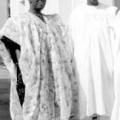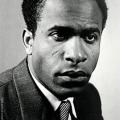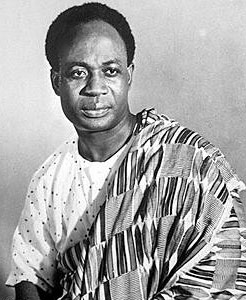104. In Unity Lies Strength: Kwame Nkrumah
The first leader of independent Ghana, Kwame Nkrumah, writes against neocolonialism and in favor of socialism and Pan-Africanism.
Themes:
• K. Nkrumah, Towards Colonial Freedom: Africa in the Struggle Against World Imperialism (London: 1962).
• K. Nkrumah, Africa Must Unite (New York: 1963).
• K. Nkrumah, Neo-Colonialism: the Last Stage of Imperialism (New York: 1965).
• K. Nkrumah, Consciencism: Philosophy and Ideology for De-Colonization (New York: 1970, first ed. 1964).
• K. Nkrumah, Class Struggle in Africa (New York: 1970).
---
• A. Biney, The Political and Social Thought of Kwame Nkrumah (New York: 2011).
• B. Cissé, “La problématique de la renaissance africaine dans le Consciencisme de Nkrumah: pour une relecture du socialisme africain,” Présence africaine 185-186 (2012), 61-78.
• B. Davidson, Kwame Nkrumah: a View of the Life and Times of Kwame Nkrumah (Oxford: 2007).
• B. Lundt, Kwame Nkrumah 1909-1972: a Controversial African Visionary (Stuttgart: 2016).
• C. Martin, “Nkrumah’s Strategy of Decolonization: Originality and Classicism,” Présence Africaine 85 (1973), 74-105.
• S. Metz, “In Lieu of Orthodoxy: The Socialist Theories of Nkrumah and Nyerere,” Journal of Modern African Studies 20 (1982), 377-92.
• D. Rooney, Kwame Nkrumah: Vision and Tragedy (Accra: 2007).
• Y. Smertin, Kwame Nkrumah (New York: 1987).
• M.W. Williams, “Nkrumahism as an Ideological Embodiment of Leftist Thought Within the African World,” Journal of Black Studies 15 (1984), 117-34.






Comments
Pan Africanism
In this series, we have not heard at all about Morocco, Libya, Algeria, or Tunisia. Obviously time constraints might be the limitation here, but i do have a few questions on them.
How do these nations see themselves as part (or not part) of pan-Africanism/how does the pan-African movement see them?
What connection, if any, is seen between indigenous north Africans such as the Amazigh, and those who write about oppression of blacks in the Americas?
And how has a desire to claim Ancient Egypt's legacy for Africa changed the relationship Egypt has with pan-Africanism, vs other Mediterranean African nations?
Mark Langan from KCL on Nkrumah's analysis of neocolonialism
Mark Langan at King's College London (!) recently wrote a book Neo-Colonialism and the Poverty of 'Development' in Africa, where he argues for the contemporary relevance of Nkrumah's philosophy of neocolonialism. Neocolonialism as an analytic of African political economy and international relations has fallen out of favor in the last few decades, and so Langan wants to argue for the relevance of Nkrumah's formulation of neocolonialism. It's necessary reading for anyone interested in Nkrumah's contemporary relevance as a philosopher!
https://link.springer.com/book/10.1007/978-3-319-58571-0
Summary of the book:
Langan reclaims neo-colonialism as an analytical force for making sense of the failure of ‘development’ strategies in many African states in an era of free market globalisation. Eschewing polemics and critically engaging the work of Ghana’s first President – Kwame Nkrumah – the book offers a rigorous assessment of the concept of neo-colonialism. It then demonstrates how neo-colonialism remains an impediment to genuine empirical sovereignty and poverty reduction in Africa today. It does this through examination of corporate interventions; Western aid-giving; the emergence of ‘new’ donors such as China; EU-Africa trade regimes; the securitisation of development; and the UN Sustainable Development Goals. Throughout the chapters, it becomes clear that the current challenges of African development cannot be solely pinned on so-called neo-patrimonial elites. Instead it becomes imperative to fully acknowledge, and interrogate, corporate and donor interventions which lock many poorer countries into neo-colonial patterns of trade and production. The book provides an original contribution to studies of African political economy, demonstrating the on-going relevance of the concept of neo-colonialism, and reclaiming it for scholarly analysis in a global era.
Add new comment